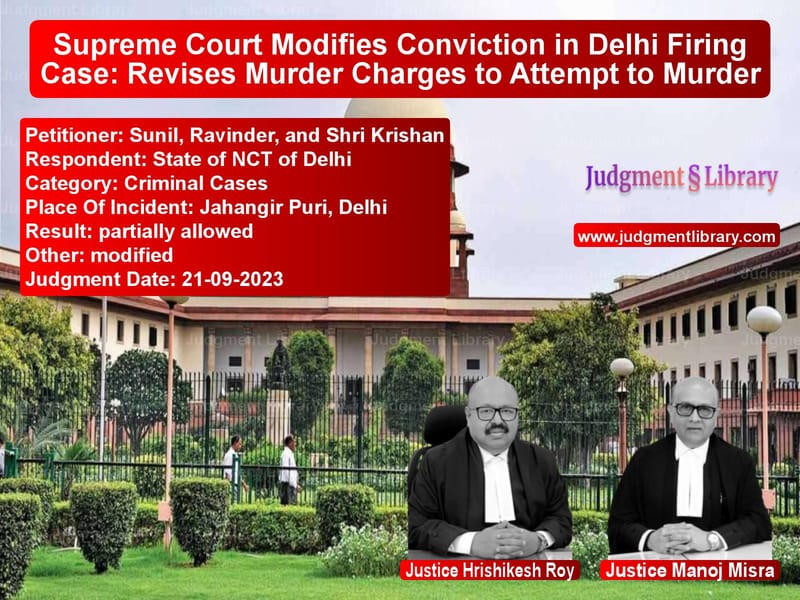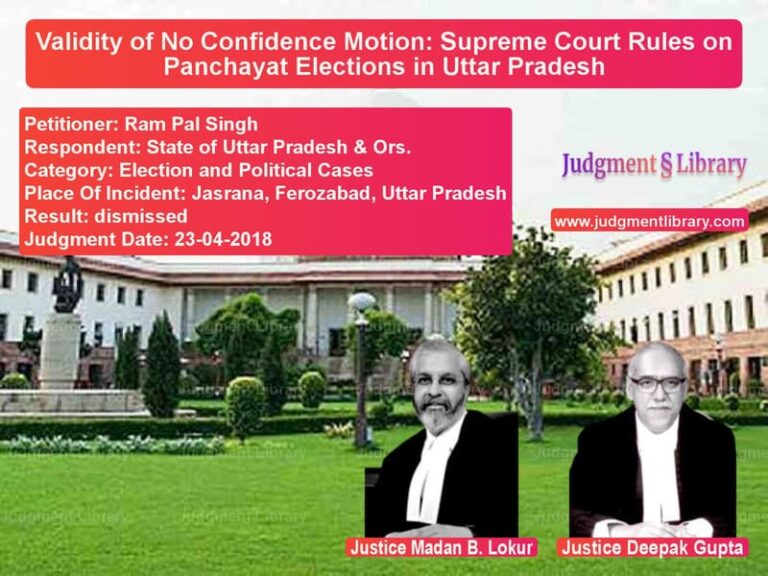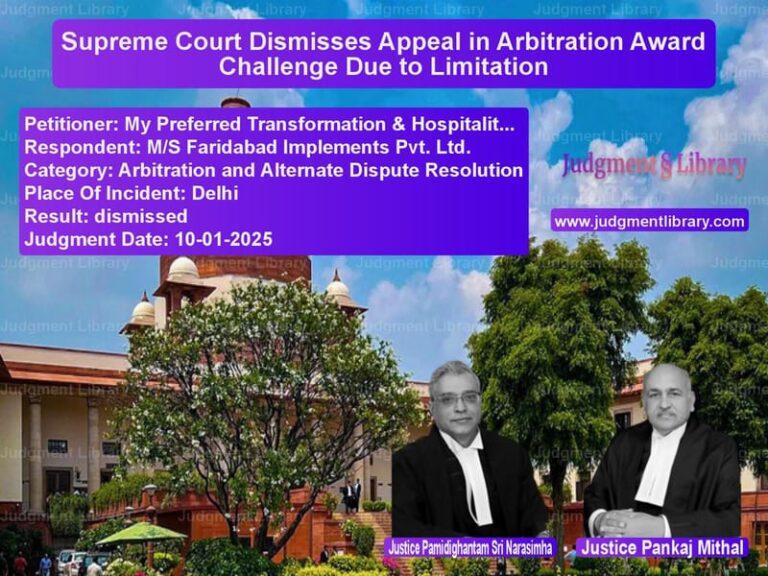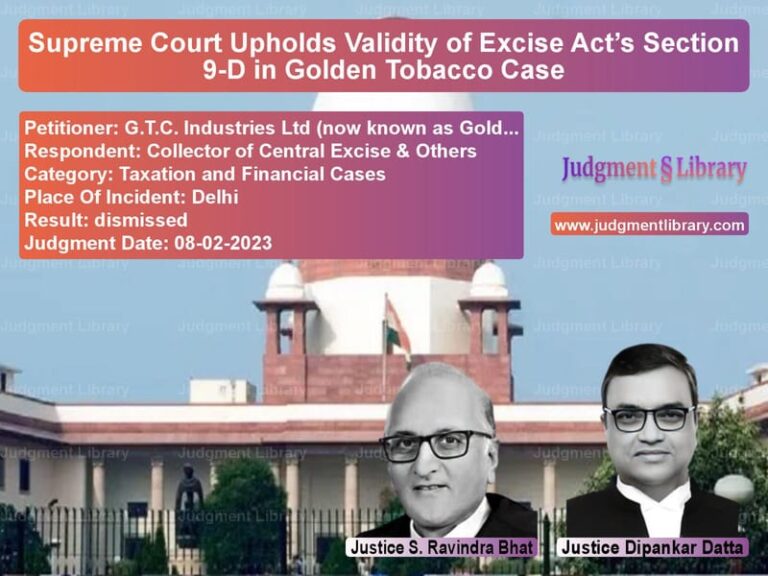Supreme Court Modifies Conviction in Delhi Firing Case: Revises Murder Charges to Attempt to Murder
The Supreme Court of India has delivered a crucial judgment modifying the conviction of three appellants—Sunil, Ravinder, and Shri Krishan—in a criminal case related to indiscriminate firing that resulted in multiple casualties in Jahangir Puri, Delhi. The Court partially allowed their appeals by setting aside their conviction under Section 302 IPC (murder) but upheld their conviction under Section 307 IPC (attempt to murder). The ruling is a significant interpretation of common intention under Section 34 IPC and the extent of vicarious liability in criminal acts.
Background of the Case
The case stems from an incident on 11 November 1998, when a dispute escalated into gunfire, resulting in the deaths of two individuals—Anil Kumar and Vijay—and injuries to 26 others. The main accused, Babu Ram @ Fauji, fired multiple shots from his licensed firearm. The prosecution alleged that the three appellants had instigated Babu Ram to fire upon a crowd in a residential area.
The trial court convicted Babu Ram and the three appellants under Sections 302/34 IPC (murder with common intention) and 307/34 IPC (attempt to murder with common intention). The Delhi High Court upheld these convictions on 28 July 2009, leading to an appeal before the Supreme Court.
Charges and Conviction
The appellants were convicted and sentenced as follows:
- Life imprisonment under Section 302/34 IPC (murder with common intention), with a fine of ₹2,000 and a default sentence of six months.
- Five years of rigorous imprisonment under Section 307/34 IPC (attempt to murder with common intention), with a fine of ₹1,000 and a default sentence of three months.
Prosecution’s Allegations
The prosecution alleged:
- The incident began with an altercation between Shri Krishan and Lala Satpal over an alleged case of eve-teasing involving family members.
- Following the altercation, Babu Ram and the appellants left the scene, threatening to retaliate.
- Shortly thereafter, Babu Ram, along with the three appellants, appeared on the rooftop of a house and opened fire on people standing in the street below.
- The appellants allegedly exhorted Babu Ram to shoot, directing him not to spare anyone who supported Satpal.
- The gunfire resulted in two deaths and multiple injuries.
Appellants’ Defense
The defense raised the following arguments:
- The appellants were falsely implicated due to familial ties with Babu Ram.
- The main accused, Babu Ram, admitted to firing the shots but claimed he acted in self-defense.
- The prosecution failed to prove a prior meeting of minds or a common intention among the appellants to commit murder.
- The statements of witnesses lacked clarity regarding whether the appellants specifically instigated the killing of Anil and Vijay.
- The appellants’ conviction was flawed because the trial court did not put the specific charge of instigation to them during their Section 313 CrPC examination.
Supreme Court’s Analysis
A bench comprising Justices Hrishikesh Roy and Manoj Misra examined the evidence and arrived at the following key conclusions:
1. Common Intention Under Section 34 IPC
The Court noted that common intention requires a prior concert or a meeting of minds, which can be developed suddenly. However, in this case, the prosecution failed to prove that the appellants intended for Babu Ram to specifically kill Anil and Vijay. The Court ruled:
“To fasten liability with the aid of Section 34 IPC, it must be proved that the act was done in furtherance of the common intention of all. Mere presence at the scene of crime or a general exhortation is not enough.”
2. Exhortation and its Legal Effect
While the prosecution witnesses testified that the appellants had urged Babu Ram to shoot, there was no clarity on whether they specifically directed him to shoot Anil and Vijay. The Court ruled:
“A general exhortation to fire at supporters of Satpal does not automatically make the appellants liable for murder unless there is clear evidence linking their exhortation to the killing of the deceased.”
3. Conviction for Attempt to Murder (Section 307 IPC)
Despite overturning the murder conviction, the Court upheld the appellants’ conviction under Section 307 IPC, stating:
“The indiscriminate firing continued for 20-25 minutes, causing injuries to 26 persons. The appellants were present and instigating Babu Ram. This establishes their common intention to cause grievous injuries.”
4. Failure to Put Specific Charges in Section 313 CrPC Examination
The Court acknowledged that the specific charge of instigation was not put to the appellants during their Section 313 CrPC examination. However, it ruled that this did not prejudice their defense, as they had ample opportunity to cross-examine prosecution witnesses and were fully aware of the allegations.
Final Verdict
The Supreme Court ruled:
- The conviction under Section 302/34 IPC (murder) was set aside.
- The conviction under Section 307/34 IPC (attempt to murder) was upheld.
- The appellants’ life imprisonment sentence was removed.
- Their sentence of five years of rigorous imprisonment under Section 307 IPC remained intact.
- If the appellants had already served their five-year sentence, they would not need to return to custody.
Implications of the Judgment
This ruling is significant for several reasons:
- Clarifies Common Intention Under Section 34 IPC: A general exhortation is not enough to convict someone for murder; specific intent must be established.
- Reduces Scope of Vicarious Liability: Family members of an assailant cannot be convicted for murder unless their involvement is directly linked to the fatal act.
- Upholds Liability for Attempt to Murder: Instigating indiscriminate firing still makes an individual liable for attempting to cause death.
- Ensures Fair Criminal Proceedings: The ruling reaffirms that failure to frame a charge properly under Section 313 CrPC does not automatically vitiate a trial unless prejudice is proved.
Conclusion
The Supreme Court’s ruling in Sunil & Ors. vs. State of NCT of Delhi provides critical clarity on the applicability of Section 34 IPC and the evidentiary burden required to establish common intention in cases involving group violence. By modifying the conviction, the Court has ensured a balance between justice and fairness, ensuring that punishment is proportionate to the role played by each accused.
Petitioner Name: Sunil, Ravinder, and Shri Krishan.Respondent Name: State of NCT of Delhi.Judgment By: Justice Hrishikesh Roy, Justice Manoj Misra.Place Of Incident: Jahangir Puri, Delhi.Judgment Date: 21-09-2023.
Don’t miss out on the full details! Download the complete judgment in PDF format below and gain valuable insights instantly!
Download Judgment: sunil,-ravinder,-and-vs-state-of-nct-of-delh-supreme-court-of-india-judgment-dated-21-09-2023.pdf
Directly Download Judgment: Directly download this Judgment
See all petitions in Attempt to Murder Cases
See all petitions in Bail and Anticipatory Bail
See all petitions in Custodial Deaths and Police Misconduct
See all petitions in Judgment by Hrishikesh Roy
See all petitions in Judgment by Manoj Misra
See all petitions in partially allowed
See all petitions in Modified
See all petitions in supreme court of India judgments September 2023
See all petitions in 2023 judgments
See all posts in Criminal Cases Category
See all allowed petitions in Criminal Cases Category
See all Dismissed petitions in Criminal Cases Category
See all partially allowed petitions in Criminal Cases Category







